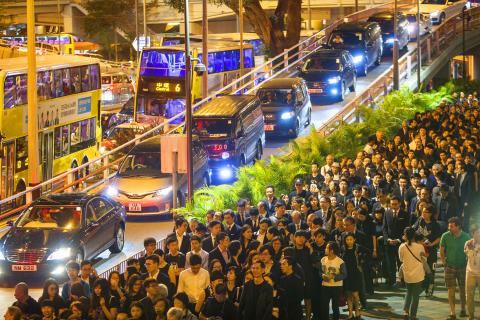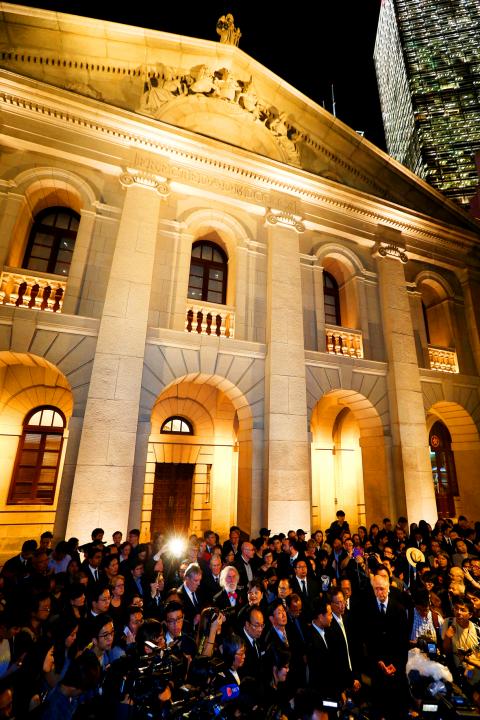Hundreds of Hong Kong lawyers dressed in black yesterday marched through the heart of the territory in silence to condemn a move by China that effectively bars two elected pro-independence lawmakers from taking their seats in the legislature.
Local and foreign lawyers walked from the High Court to the Court of Final Appeal, underscoring growing concern among Hong Kong’s legal elite with how Beijing has handled affairs in the “special administrative region.”
The demonstration follows a decision by China’s National People’s Congress to interpret Hong Kong’s mini-constitution, or Basic Law, to effectively bar the independence lawmakers from taking their oaths of office.

Photo: EPA
“We want to express that interpretation is not the norm of the Hong Kong legal system,” said barrister and Legislator Dennis Kwok (郭榮鏗), who organized the rally. “We will not accept interpretation becoming the norm.”
As the lawyers marched, about a dozen pro-Beijing protesters taunted them, some shouting obscenities through loudspeakers.
One Beijing loyalist held up a placard that read: “Rioters mess up Hong Kong.”

Photo: Reuters
Beijing’s ruling on Monday that oaths for Hong Kong lawmakers must be taken accurately, sincerely and solemnly for them to be valid, just as a local judicial review of the case was under way, rattled many in the legal profession, political circles and beyond.
The High Court is set to decide if pro-independence Youngspiration lawmakers Sixtus “Baggio” Leung (梁頌恆), 30, and Yau Wai-ching (游蕙禎), 25, might be disqualified after they displayed a “Hong Kong is not China” banner during a swearing-in ceremony on Oct. 12 which resulted in their oaths being invalidated.
Hong Kong has thrived as a financial and legal center thanks in part to its independent rule of law, which many inside and outside the territory now see as under threat.
The Hong Kong Bar Association, which represents more than 1,000 barristers, expressed regret over the interpretation, saying it would “do more harm than good” and gave the impression that Beijing was effectively legislating for Hong Kong.
The march was only the fourth such protest by the territory’s lawyers since 1997.
The last march, in June 2014, was in response to a white paper by China’s Cabinet that declared “loving the country” was a basic political requirement for all Hong Kong administrators, including judges and judicial personnel.
Monday’s ruling breaks new ground because it is the first time that Beijing has acted in a pending court case without a request by the Hong Kong government or judiciary, and because it appears to establish a mechanism for authorities to block critics of Chinese Communist Party rule from taking elected office or even getting their names on ballots.
Some academics said the decision went beyond interpreting the charter and amounted to rewriting the local statute governing how officials are to be sworn in.
It requires lawmakers to read their oaths “completely and solemnly,” exactly as written, and orders those who administer oaths to disqualify lawmakers who alter or deliver the words in an “insincere or undignified manner,” barring them from office without another chance to be sworn in.
The decision also says lawmakers will be held liable if they violate their oaths, but it provides no guidance on who has the power to determine whether a lawmaker is in breach or what the punishment should be.
The fear is that this will inject a degree of arbitrariness into a system that is based on rules underpinned by centuries of precedent under British common law.
Additional reporting by NY Times News Service

The CIA has a message for Chinese government officials worried about their place in Chinese President Xi Jinping’s (習近平) government: Come work with us. The agency released two Mandarin-language videos on social media on Thursday inviting disgruntled officials to contact the CIA. The recruitment videos posted on YouTube and X racked up more than 5 million views combined in their first day. The outreach comes as CIA Director John Ratcliffe has vowed to boost the agency’s use of intelligence from human sources and its focus on China, which has recently targeted US officials with its own espionage operations. The videos are “aimed at

STEADFAST FRIEND: The bills encourage increased Taiwan-US engagement and address China’s distortion of UN Resolution 2758 to isolate Taiwan internationally The Presidential Office yesterday thanked the US House of Representatives for unanimously passing two Taiwan-related bills highlighting its solid support for Taiwan’s democracy and global participation, and for deepening bilateral relations. One of the bills, the Taiwan Assurance Implementation Act, requires the US Department of State to periodically review its guidelines for engagement with Taiwan, and report to the US Congress on the guidelines and plans to lift self-imposed limitations on US-Taiwan engagement. The other bill is the Taiwan International Solidarity Act, which clarifies that UN Resolution 2758 does not address the issue of the representation of Taiwan or its people in

US Indo-Pacific Commander Admiral Samuel Paparo on Friday expressed concern over the rate at which China is diversifying its military exercises, the Financial Times (FT) reported on Saturday. “The rates of change on the depth and breadth of their exercises is the one non-linear effect that I’ve seen in the last year that wakes me up at night or keeps me up at night,” Paparo was quoted by FT as saying while attending the annual Sedona Forum at the McCain Institute in Arizona. Paparo also expressed concern over the speed with which China was expanding its military. While the US

SHIFT: Taiwan’s better-than-expected first-quarter GDP and signs of weakness in the US have driven global capital back to emerging markets, the central bank head said The central bank yesterday blamed market speculation for the steep rise in the local currency, and urged exporters and financial institutions to stay calm and stop panic sell-offs to avoid hurting their own profitability. The nation’s top monetary policymaker said that it would step in, if necessary, to maintain order and stability in the foreign exchange market. The remarks came as the NT dollar yesterday closed up NT$0.919 to NT$30.145 against the US dollar in Taipei trading, after rising as high as NT$29.59 in intraday trading. The local currency has surged 5.85 percent against the greenback over the past two sessions, central